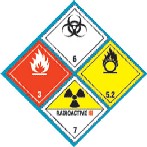|
The International Maritime Dangerous Goods (IMDG) Code was developed as a uniform international code for the transport of dangerous goods by sea covering such matters as packing, container traffic and stowage, with particular reference to the segregation of incompatible substances.

Development of the IMDG Code
The development of the IMDG Code dates back to the 1960 Safety of Life at Sea Conference, which recommended that Governments should adopt a uniform international code for the transport of dangerous goods by sea to supplement the regulations contained in the 1960 International Convention for the Safety of Life at Sea (SOLAS).
A resolution adopted by the 1960 Conference said the proposed code should cover such matters as packing, container traffic and stowage, with particular reference to the segregation of incompatible substances.
A working group of IMO's Maritime Safety Committee began preparing the Code in 1961, in close co-operation with the United Nations Committee of Experts on the Transport of Dangerous Goods, which in a 1956 report had established minimum requirements for the transport of dangerous goods by all modes of transport.
Since its adoption by the fourth IMO Assembly in 1965, the IMDG Code has undergone many changes, both in appearance and content to keep pace with the ever-changing needs of industry. Amendments which do not affect the principles upon which the Code is based may be adopted by the MSC, allowing IMO to respond to transport developments in reasonable time.
Amendments to the IMDG Code originate from two sources; proposals submitted directly to IMO by Member States and amendments required to take account of changes to the United Nations Recommendations on the Transport of Dangerous Goods which sets the basic requirements for all the transport modes.
Amendments to the provisions of the United Nations Recommendations are made on a two-yearly cycle and approximately two years after their adoption, they are adopted by the authorities responsible for regulating the various transport modes. In that way a basic set of requirements applicable to all modes of transport is established and implemented, thus ensuring that difficulties are not encountered at inter-modal interfaces.
IMDG Code classes
For the purposes of this Code, dangerous goods are classified in different classes, to subdivide a number of these classes and to define and describe characteristics and properties of the substances, material and articles which would fall within each class or division. General provisons for each class or division are given. Individual dangerous goods are listed in the Dangerous Goods List, with the class and any specific requirements.
In accordance with the criteria for the selection of marine pollutants for the purposes of Annex III of the International Convention for the Prevention of Pollution from Ships, 1973, as modified by the Protocol of 1978 relating thereto (MARPOL 73/78), a number of dangerous substances in the various classes have also been identified as substances harmful to the marine environment (MARINE POLLUTANTS).
Responsibilities
The classification shall be made by the shipper/consignor or by the appropriate competent authority where specified in this Code.
Classes, divisions, packing groups
Substances (including mixtures and solutions) and articles subject to the provisions of this Code are assigned to one of the classes 1-9 according to the hazard or the most predominant of the hazards they present. Some of these classes are subdivided into divisions. These classes or divisions are as listed below:
Class 1: Explosives
Division 1.1: substances and articles which have a mass explosion hazard
Division 1.2: substances and articles which have a projection hazard but not a mass explosion hazard
Division 1.3: substances and articles which have a fire hazard and either a minor blast hazard or a minor projection hazard or both, but not a mass explosion hazard
Division 1.4: substances and articles which present no significant hazard
Division 1.5: very insensitive substances which have a mass explosion hazard
Division 1.6: extremely insensitive articles which do not have a mass explosion hazard
Class 2: Gases
Class 2.1: flammable gases
Class 2.2: non-flammable, non-toxic gases
Class 2.3: toxic gases
Class 3: Flammable liquids
Class 4: Flammable solids; substances liable to spontaneous combustion; substances which, in contact with water, emit flammable gases
Class 4.1: flammable solids, self-reactive substances and desensitized explosives
Class 4.2: substances liable to spontaneous combustion
Class 4.3: substances which, in contact with water, emit flammable gases
Class 5: Oxidizing substances and organic peroxides
Class 5.1: oxidizing substances
Class 5.2: organic peroxides
Class 6: Toxic and infectious substances
Class 6.1: toxic substances
Class 6.2: infectious substances
Class 7: Radioactive material
Class 8: Corrosive substances
Class 9: Miscellaneous dangerous substances and articles
The numerical order of the classes and divisions is not that of the degree of danger. |